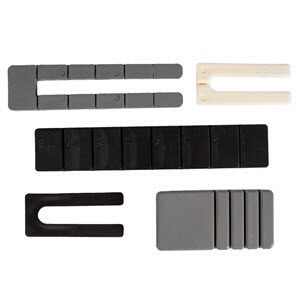Call Us: 978-534-5188
We live in an imperfect world. Stairs creak. Windows need replacing. Corners form 88- or 91-degree angles. Slot A doesn’t quite line up with tab B. When do-it-yourselfers or even master carpenters and stonemasons meet with these disappointments, however, they can turn to the shim to restore order.
Builders and repair people use these miracle workers that can be designed in various sizes, thicknesses, and styles to align parts, level surfaces, fill gaps, and perform other critical duties in a variety of construction and repair operations.
Because there are so many functions they can be used for, shim material goes a long way in determining which is right for each application. Common shim materials include wood, plastic, and metal, and each has its advantages and drawbacks:
Usually made of light, soft woods such as cedar and pine, wood shims are most commonly used to keep window frames and doors straight when hanging them in their roughed openings. Wood shim material has a rough finish that gives it good friction, allowing them to stay in place without slipping, especially when used to align or elevate wooden building materials. They also can be glued together to form thicker shims. Wood shims can be scored with a shop knife and then snapped off to create the exact length needed for any application.
However, wood shims are not ideal for jobs that may be exposed to water, inclement weather, or excess heat. They absorb water, which can cause them to warp and rot. And, of course, wood is flammable, so they should not be used where they could catch a spark.
Constructed of stainless steel as well as aluminum, brass, copper, and other nonferrous materials to eliminate rust, metal shims shine in industrial applications. Their high composite strength makes them ideal for aligning production and packaging equipment and other automation. The variety of metal shim materials makes them adaptable to their environment; stainless steel shims are corrosion resistant; high-carbon steels withstand high heat; brass is impervious to saltwater corrosion.
But for general-purpose use outside of heavy manufacturing, metal shims often prove impractical. They are heavier and more expensive than wood or plastic. And they are difficult to cut and shape, making them inappropriate for delicate work. They also are more rigid than the other two shim materials. They lack the pliability of plastic, making them vulnerable to vibration, friction, and other forces that can move them out of alignment.
 Made from materials such as Polypropylene (PP), High-Impact Polystyrene (HIPs), and ABS, plastic shims are the most versatile of the three common shim materials. Requiring little or no shaping, and available in consistent shapes, thicknesses, and material properties, plastic shims save labor time. They are stronger and more durable than wood and lighter and cheaper than metal. Unlike wood, they are impervious to water, making them perfect for a variety of construction applications including in-house restoration, such as window and door replacement, as well as outdoor construction, such as precast and tilt-up.
Made from materials such as Polypropylene (PP), High-Impact Polystyrene (HIPs), and ABS, plastic shims are the most versatile of the three common shim materials. Requiring little or no shaping, and available in consistent shapes, thicknesses, and material properties, plastic shims save labor time. They are stronger and more durable than wood and lighter and cheaper than metal. Unlike wood, they are impervious to water, making them perfect for a variety of construction applications including in-house restoration, such as window and door replacement, as well as outdoor construction, such as precast and tilt-up.
Plastic shims are more expensive than wood, and cannot be welded like metal, which can make them the wrong fit depending on the application’s requirements. However, plastic’s physical properties make these shims the product of choice where fast-paced construction is desired.
Understanding the role of the shim allows you to choose the best material and shape for your application. When used as temporary alignment aids, shims need to meet basic requirements for size, strength, and ease of use. For permanent use, shims are subject to more extensive requirements to ensure the continued performance of materials they support and separate. Although small, shims play an important part in a construction project’s success.
When selecting the right shim for your application, your manufacturer choice is equally important. If you are looking for a plastic shim expert, look no further. Grove Shims is here to help you level objects easily and efficiently with our high-quality color-coded plastic shims.